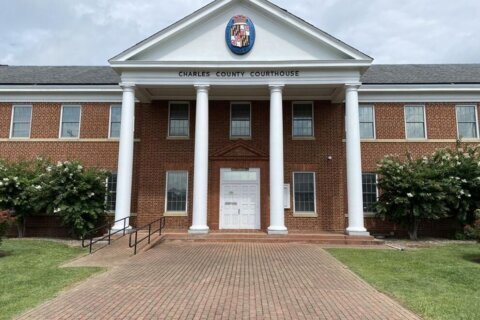This article was republished with permission from WTOP’s news partners at Maryland Matters. Sign up for Maryland Matters’ free email subscription today.
When Greg Waring heard that Charles County leaders needed someone to head a commission looking at how the county government operates ― and how it ought to operate in the future ― he leaped at the opportunity.
As staff director for Democrats on the U.S. House Budget Committee, Waring had seen the highs and lows of federal government, and the benefits of a system with checks and balances, from his vantage point on Capitol Hill. He figured he’d have something to contribute to the community conversation.
“I thought I had a good skill-set that could help,” the Charles County native said in an interview last week.
Over a period of several months, Waring and his fellow commissioners traveled to every corner of the booming Southern Maryland county, listening to residents. What they came up with was a 36-page proposal to bring a charter government to Charles County, with a county executive and five elected council members ― a change from the current home rule system, which features five county commissioners who set policy.
“I believe we’ve outgrown this system of government,” Waring said. “There’s no checks in this system. There’s no checks on anything when you have a part-time commission. We think when you separate a dedicated council with a full-time executive, you get a better system.”
The charter proposal is on the ballot next week. If it passes, the county government will take steps for a transition that would culminate with the election of an executive and five district-based council members in 2026. If it fails, the status quo will prevail.
“I am very encouraged when I talk to residents and explain in simple terms how Charles County operates today and how over the past 20 years we simply have more development, more traffic and higher costs,” Waring said.
But nothing is simple with the politics in Charles County, a jurisdiction that has seen enormous growth and equally consequential demographic changes over the past two decades ― and is now the most affluent majority-Black jurisdiction in the United States.
Powerful forces have lined up to oppose the charter amendment. Race relations are inevitably part of the debate. And a fissure on the county commission over day-to-day management of the county has come into play as voters consider whether to shake up the local government.
“The truth is a subterranean river flowing under the glittering surface of things,” Gary Hodge, a former county commissioner and president of Regional Policy Advisors, a government consulting firm, said in an interview.
On the surface, the debate is simple enough: It’s whether a charter form of government will lead to a more effective, more financially efficient and more transparent government than residents have now. With a population of about 170,000, Charles County is far and away the biggest jurisdiction in the state without a charter government ― and is bigger than four of the 11 counties in Maryland with a charter government.
A charter amendment was on the ballot 10 years ago, and it was rejected by a 57% to 43% vote. But the electorate has changed considerably since then, and the turnout in a presidential election year is substantially different than it was in 2014, a midterm year with most state and local offices on the ballot.
This time, debate over the charter amendment “is pretty contentious,” Reuben B. Collins II (D), president of the Board of Commissioners conceded. “But I’m pretty confident that it’s going to pass.”
In a recent interview at the Metropolitan Washington Council of Governments headquarters, where he’s the vice chair, Collins noted that more than half of Maryland’s population lives in jurisdictions with charter governments.
“It’s putting us in line with the rest of the state,” he said.
Collins, who spent 12 years on the board before becoming president in 2018, the only commissioner elected countywide instead of from a district, isn’t saying publicly whether he’s aspiring to be the first Charles County executive, if the charter question passes next week. But that’s the supposition of several people involved in local politics.
“Government is for workhorses, not for show horses,” Hodge said when he testified at a charter commission hearing earlier this year. “This looks like a vanity project to me. Someone wants to be county executive. That’s not what the public is concerned about. The public wants results.”
But charter advocates argue that a new system of government will create greater results. Charles County under the commission system has decentralized government, they say ― which minimizes its accountability to the public. A county executive can not only be a local leader but a high-profile point person around the state and region who can do the public’s bidding in Annapolis and take the lead on attracting economic development projects to the county.
“This county has grown faster than anyone expected,” said Dyotha R. Sweat, the president of the Charles County branch of the NAACP, a key supporter of the charter amendment. “As the most affluent jurisdiction with an African-American majority in the country, we need a strong executive advocating for us. Our form of government is not here managing the people well. We are not getting resources to the places that need it the most.”
But opponents to the ballot question see things completely differently. County Commissioner Gilbert “BJ” Bowling III (D) said “the centralization of government [as laid out in the charter proposal] worries a lot of people.”
“It’s been a long road to get here and I’ve been very vocal since the beginning that the citizens don’t want it,” Bowling said. “It’s not about the title you have when you go to Annapolis. It’s about your leadership ability. And there’s nothing you can do as a charter county that you can’t do under home rule.”
Bowling and other critics have also mentioned the cost of any transition. It has been officially estimated at about $1.6 million, but when the necessary expansion of government buildings and facilities is factored in, it could be closer to $6 million, Bowling argued ― at a time when requests for county spending earlier this year came in at $37 million higher than the budget.
Some powerful opponents
The charter proposal does call for the establishment of an inspector general position, to root out wrongdoing in county government and keep a close eye on government expenditures. That person would be appointed by and accountable to the county council rather than the executive.
“People really like this feature of the charter,” Waring said.
But that hasn’t stopped some powerful interests from lining up against the ballot amendment. It’s led by the Fraternal Order of Police Lodge #24, the Charles County Volunteer Fire & Emergency Medical Services and the Charles County Farm Bureau. To some charter supporters, these groups are seen as agents of the “old” Charles County ― whiter and more agrarian than it is now.
Equally significant was the recently announced opposition of the Education Association of Charles County.
“The system as is works, the relationships between the county government, the county school system, and our union are stronger than they’ve been in a long time, and because of that, we don’t think it’s worth giving up something we know works for something we have serious questions about,” said Sean Heyl, the union president.
Like other critics of the charter amendment, the teachers’ union said it saw too many “gray areas” in the proposal, including what the relationship between the county government and school system would be and how money would be delivered to the schools.
The teachers’ opposition surprised and disappointed charter advocates. Now the big public employee unions are arrayed in opposition, while the NAACP and some Democratic groups are the primary supporters.
Both sides acknowledge that many voters may not completely understand what the debate is all about.
The charter vote comes as the county continues to evolve politically. Once a tobacco-growing area with conservative white politicians ― Democrats and Republicans ― Charles County over the past few elections has become a Democratic stronghold with mostly Black representatives.
Four of the five county commissioners are Black ― Bowling is the exception. The entire state legislative delegation is Black. So are the sheriff, Troy Berry and the state’s attorney, Tony Covington. All are Democrats.
Still, there are quiet racial overtones in the fight over the proposed charter.
“I think the charter conversation has exposed and ripped off Band-Aids that we’ve had for several years now,” Waring said. “Charles County has really grown and is thriving and more diverse, but the power structure of the government building doesn’t reflect that.”
Sweat, the NAACP chief, said she’s detected that a lot of the opposition to the charter question is coming from “old-line” residents, and said that in a charter government, “the citizens will have more of a voice.” She added that it’s up to her organization to “bring the power of the voice of the NAACP” to the closing arguments over the ballot question, in order to motivate voters.
Bowling rejects the notion that the current form of government has held back the aspirations and political or economic opportunities of Charles County’s Black residents.
“There are some charter proponents who are trying to take it down that road,” he said. “We’re the wealthiest, majority-Black jurisdiction in the country, and that happened under home rule government.
“People, regardless of where you come from or whoever you are, just want good, efficient government.”
‘The government you elect is the government you deserve’
Part of what’s coloring the debate over the charter ― in incalculable ways politically ― is a long, nasty and hard-to-follow personnel dispute over the fate of the county administrator, Mark Belton, who has been on paid administrative leave for at least the past year and a half. County officials, according to coverage in the Southern Maryland News and on a blog called The Lagrasse Report, have largely cited personnel policies for withholding key details of the impasse.
Belton, who is white and is the county’s highest-paid employee with an annual salary of $235,000, was placed on leave following a dispute over county affairs with Commissioner Thomasina Coates (D), who is Black, that escalated to the point that the two filed harassment charges against each other, spurring internal investigations. Now members of the commission are in litigation against one another as some of Coates’ colleagues seek to keep her from voting on any measure that would impact Belton’s job status.
The Southern Maryland News reported Friday that Belton, who served as Maryland Secretary of Natural Resources during Republican former Gov. Larry Hogan’s first term, has been paid almost $400,000 since June 2023 for not working. It reported that he is currently listed as a program director for Throwe Environmental, a Rhode Island company that designs climate resiliency programs for local governments.
Bowling and Commissioner Amanda Stewart (D) are aligned against Coates in the lawsuit. Collins, the commission president, and Commissioner Ralph Patterson II (D) are nominally allied with Coates.
Some proponents of the charter amendment say they hope voters see the internecine warfare on the commission over Belton as the last straw, which inspires them to vote for a new form of government.
But Hodge, the former county commissioner, said the dispute reminds him of the Thomas Jefferson observation that “the government you elect is the government you deserve.”
“A charter is not inherently a better system,” Hodge said. “All systems of human governance depend on the quality of people who are elected.”







